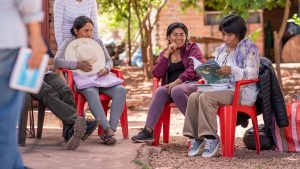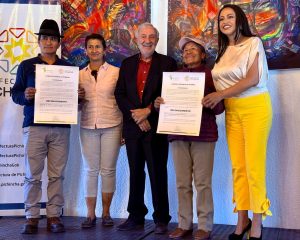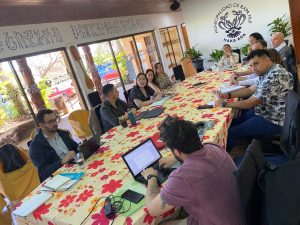Since the end of October, Rimisp and its territorial partners have visited communities in Colombia, Mexico, Guatemala, Bolivia and Ecuador...
Ecuadorian delegation explores agro-industrial development models in Chile
Members of the Ministry of Production, Foreign Trade, Industry and Fisheries – MPCEIP of Ecuador, the Consortium of Provincial Governments of Ecuador – CONGOPE, and the German Development Cooperation – GIZ, participated in an internship in Chile to learn about good Chilean practices and strengthen the territorial productive potential and promote sustainable agribusiness in Ecuador.
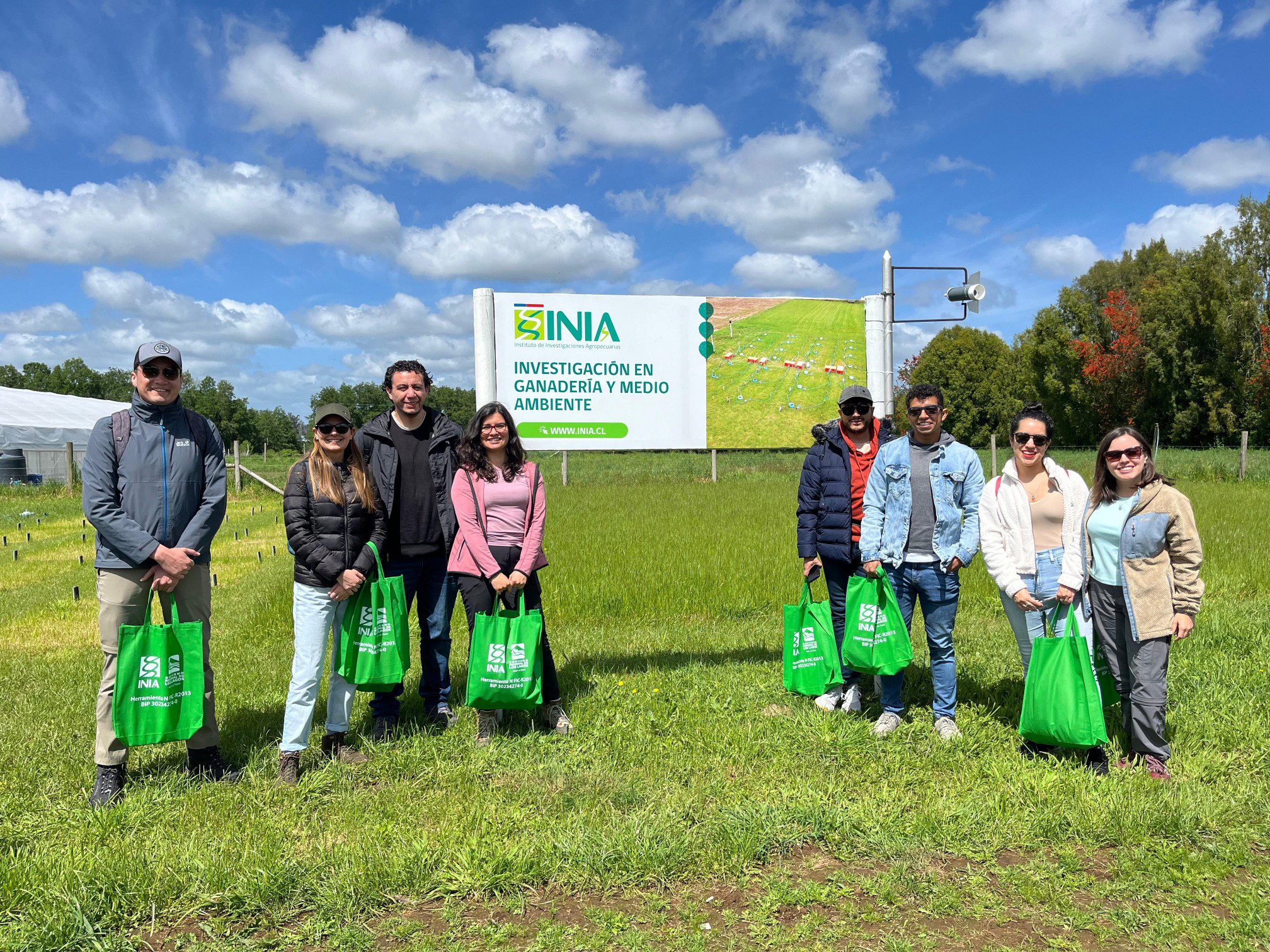
In the framework of the project ‘Capacity building in the supply of public and private services to increase the territorial productive potential by generating sustainable agribusiness’, six representatives of Ecuadorian institutions visited various regions of Chile to learn about the intervention models implemented by Chilean institutions in the agro-industrial sector. This project, promoted by the Regional Fund for Triangular Cooperation implemented by GIZ and financed by the German Federal Ministry for Economic Cooperation and Development (BMZ), seeks to take advantage of the Chilean experience to replicate successful practices in Ecuador, facilitating triangular cooperation between Chile, Ecuador and Germany
During the internship, the Ecuadorian delegation, composed of members of the Ministry of Production, Foreign Trade, Investment and Fisheries (MPCEIP); the Consortium of Autonomous Provincial Governments of Ecuador (CONGOPE), GIZ Ecuador and a consulting partner, toured several regions of Chile with the Rimisp team, in a series of visits and meetings that included:
- Day 1: The inaugural day included a reception at the Chilean Agency for International Development Cooperation (AGCID) and a presentation at the offices of CORFO and the Foundation for Agrarian Innovation (FIA) to learn about the history and guidelines of these institutions.
- Day 2: In the Los Lagos region, the delegation visited CORFO’s Integrated Territorial Dairy Programme (PTI), where initiatives aimed at the development of the dairy chain in the region were presented.
- Day 3: Carbon neutral initiatives were explored at the Instituto de Investigaciones Agropecuarias (INIA) in Osorno, financed by FIA.
- Day 4: In the Coquimbo Region, visitors learned about CORFO’s Horticultural ITP and an INIA project for the optimisation of water resources, supported by FIA.
- Day 5: The tour of the regions concluded in O’Higgins, where the PTI Agroterritorio and flower export projects, promoted by CORFO and FIA, were visited. In addition, the innovative agrotourism experience called the Route of the Abastos was visited.
- Day 6: The internship ended in Santiago with a dialogue on the experiences visited in Chile by the Ecuadorian delegation, the Rimisp team, CORFO, FIA and AGCID.
At the end of the experience, María José Pérez, Director of Agro-industrial Innovation of the MPCEIP of Ecuador, highlighted: “The experience in Chile was enriching. We took away a lot of material to work with in Ecuador, especially regarding the provision of services and the intervention models of institutions such as CORFO and FIA. Although our reality is different, I believe that many of these initiatives can be replicated and adapted in our country’.”
Henry Moreira, technical analyst of the Consortium of Autonomous Provincial Governments of Ecuador, highlighted the importance of territorial articulation in Chile: “One of the things that fascinated me most about the experience in Chile was the territorial coordination for agro-productive and tourism links. In each region we visited, economic development is generated not only in the productive sphere, but also in gastronomy and services, achieving an impressive territorial competitiveness.”
Carolina Olcay, Rimisp researcher, underlined the willingness of the territorial teams and the collaborative environment: “I am grateful for how accommodating the territorial teams were, receiving us with kindness and creating spaces for open conversations. It was an enriching experience, full of learning and opportunities for improvement for future meetings.”
This visit marks an important step in strengthening Ecuador’s capacities to develop sustainable agribusiness, using territorial advantages and promoting innovation in the agro-industrial sector, based on the lessons learned in Chile.
Learn more about the project “Analysis of the supply of territorial services for the development of agribusiness in Chile and transfer to Ecuador”.
Translation by: Alexandra Kerangal Macé.
News
Country News
Ecuador: Rimisp and Prefectura de Pichincha promote rural community tourism
The Office of Rimisp - Latin American Center for Rural Development in Ecuador and the Autonomous Decentralized Government of the...
Chile: The formulation of the Extreme Zones Development Plan advances in Rapa Nui
An intense week of work included meetings and workshops with local stakeholders to review and complement a preliminary ten-year investment...
Subscribe
Our offices:

- Chile: Huelén 10, Providencia, Santiago, Metropolitan Region (+56-2) 2236 4557 | Fax (+56-2) 2236 4558.
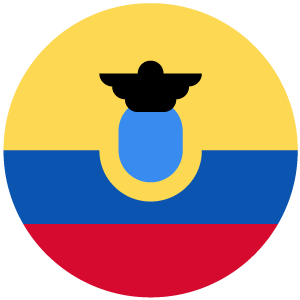
- Ecuador: Czechoslovakia E9-95 between Switzerland and Moscow. Eveliza Plaza Building. First floor. Quito. (+593-2) 5150144.

- Colombia: Carrera 9 No 72-61 Office 303. Bogotá. (+57-1) 2073 850.
